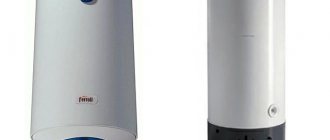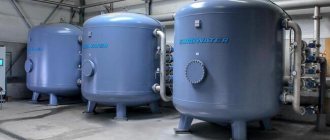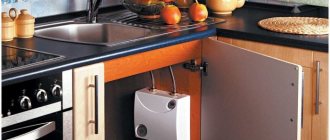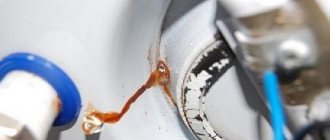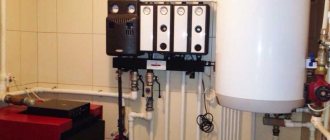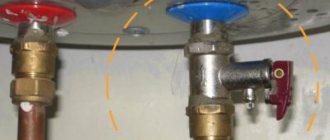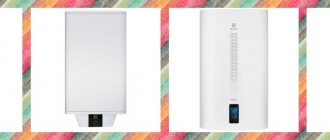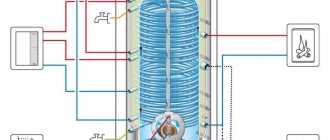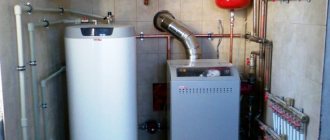Every homeowner faces an acute question in choosing a water heater. It doesn’t matter whether he lives in an apartment or in a separate house. Often the choice is between instantaneous water heaters and storage heating element boilers. Each of them has its own disadvantages and advantages. Let's compare them with each other and answer the two most exciting questions: which water heater is more practical and economical.
What is more profitable: boiler or hot water
Seasonal shutdowns and interruptions in water supply force the installation of heating equipment - then there is always hot water, but you have to spend money on purchasing and installing the device. Is it profitable to install it instead of centralized hot water?
Cost calculation example
Let's calculate approximately the costs for a family of 3-4 people. Let's say they use 200 liters of water per day - 6 cubic meters per month. Let’s compare how much such a volume will cost with and without a boiler.
Let's take an average boiler: volume - 50 liters, power - 1.5 kW. How long does it take to heat it up completely?
Calculation formula: temperature difference (final - initial, cold) * volume (l) * 4.2 (kJ/kg * degree - coefficient of heat capacity of water) / power (kW) = time (sec).
According to this formula, heating time for 50 liters = 115 minutes.
Let's calculate the power consumption using the formula: boiler power (kW) * time (h). For 50 liters it is equal to 2.93 kW/h. For 200 liters (consumption per day) = 11.6 kW = 2.93*4.
The cost of electricity per day = 3.5 * 11.6 = 40 rubles per day.
Total:
- 1200 rubles per month for electricity + 90 rubles (6*15) for cold water = 1290 rubles;
- 1 cubic meter of water = 215 rubles.
Hot water costs about the same. In this case, you need to take into account the costs of the boiler itself, its installation (mounts, socket, automatic switch).
Use this formula and calculate according to your tariffs whether it is profitable to use a heater. Below we have collected all the advantages and disadvantages of a boiler and centralized water supply - not just the price.
Pros and cons of the boiler
Pros of using a water heater:
- High efficiency. The storage device consumes only 1.5-3 kW per hour, and does not work constantly. Having brought the water to the set temperature, the heating element turns off. The thermal insulation of the tank does not allow intense heat loss. As soon as the temperature drops, the thermostat signals the heating element: it’s time to turn on.
- With a low night tariff, you can set the heating for the dark. Modern controls allow you to set all parameters.
- Independence from rolling blackouts and repairs. In the summer, hot water supply is often turned off for maintenance, and unexpected accidents sometimes occur. You can't do without a boiler here.
- Saving while you're away from home. When you leave, you can turn off the device, you will not have to pay bills for electricity and water supply.
- When installing a heater, the water will become cleaner. It is known that the flow from the water supply is not the cleanest. Sand, rust, and small debris settle on the bottom of the devices. If a filter is installed in front of the device, the water is purified from impurities - read how to choose a filter in a separate article. There are combined models that purify water not only for household needs, but also for drinking.
Which is more economical? There are different models of water heaters: some are more profitable, some are not.
Minuses:
- Powered by electricity. No voltage - no hot water. This 100% applies to instantaneous boilers: they do not have a tank to collect liquid, so it flows through the heating element and immediately moves to the mixer. In storage tanks, the water will maintain its temperature for some time.
- Duration of the first heating for storage devices. Every 10 liters are heated for 30 minutes.
- Limited fluid volume. Even with the correct calculation of the tank volume, it may not be enough when relatives arrive or a large company gathers.
- Periodic maintenance. The boiler requires descaling and replacing the magnesium anode at least once a year.
Do you need a boiler in your apartment? Keep in mind that you will have to pay not only for water, but also for electricity.
Pros and cons of hot water
Advantages of using hot water supply:
- There are no restrictions. By opening the tap, you can get as much water as you need.
- When installing a meter, you will pay strictly for the amount used.
- In case of problems, the Housing Office takes responsibility.
Flaws:
- Annual maintenance creates inconvenience for users.
- Dependence on public services. Has there been a breakdown? We'll have to wait until it's removed.
- Increase in cost per cubic meter of water. Which is cheaper? It is worth comparing the costs of operating the heater and DHW.
In general, we can conclude that the cost of servicing a boiler and the cost of hot water supply are almost the same. But the impetus for buying a water heater can be not only savings, but also convenience, the need to constantly have hot water (if you have a small child) and other factors. Calculate how much water you use - perhaps in your case the boiler will pay for itself faster.
Last update: 04/12/2018
At the end of this note there is a calculator with which you can independently estimate whether it is profitable for you to install a boiler or not.
Every year, planned hot water outages occur throughout the country. While there is time, you need to prepare and choose a boiler or water heater. Many people are starting to use it on an ongoing basis instead of the central water supply, I think it’s more profitable.
Let's consider how things really are. Is it profitable to use a water heater (boiler) instead of hot water from pipes, or is central water supply still cheaper?
Most popular models
The store offers a lot of models of water heaters and boilers, but among all the offers there are the best models, according to experts and buyers. Among water heaters and boilers, there are 5 models suitable for different categories of consumers.
Electrolux EWH 100 Royal
An expensive boiler model is equipped with many different protection options. The storage system can collect and heat 100 liters. The device is equipped with several directions of water output, has a built-in display and allows mechanical control of built-in functions. As protection, the boiler is equipped with a safety and check valve, an RCD system, protection against switching on without water and the possibility of overheating. The device has a stylish narrow shape and modern design.
Device parameters:
- capacity 100 l;
- liquid heating period 160 minutes;
- heating element power 2 kW;
- maximum temperature of heated water 75°C;
- the pressure at the exit points is adjustable 0.7-6 atm;
- weight 21 kg;
- external parameters 493x1210x290 mm.
The average price reaches 18,290 rubles.
Electrolux EWH 100 Royal
Electrolux NPX6 Aquatronic Digital
A good model in all respects, it is characterized by build quality and high power. An electric heating element in the form of a spiral is installed inside the device. The system is equipped with an electronic display, control system and built-in overheating protection. Water supply is carried out from above.
Main characteristics:
- heating rate 2.8 l/min;
- energy consumption 5.7 kW;
- the pressure created at the exit is 7 atm;
- weight 1.69 kg;
- size 191x141x85 mm.
The average price in the store is 7,550 rubles.
Electrolux NPX6 Aquatronic Digital
Thermex Flat Plus IF 50V
The storage system has an ideal combination of price and quality. The built-in container allows you to collect and heat 50 liters. The manufacturer has provided the boiler with an electronic display and the possibility of electronic control. There are heating and power-on indicators on the tank. The user can set an accelerated heating mode or set a limit on the temperature set. The device has built-in overheating protection, an RCD and a check valve, and a self-cleaning system is provided. The boiler has a modern super-flat shape.
Boiler indicators:
- capacity 50 l;
- consumed electricity 2 kW;
- heating time 80 minutes;
- external data 887x250x436 mm;
- outlet pressure 05, – 6 atm.;
- heating degrees up to 75°C;
- weight 16 kg.
The price in stores is 13,600 rubles.
Thermex Flat Plus IF 50V
Hyundai H-IWR1-3P-CS
The electric flow device has been noted by many customers as a reliable and convenient water heating system. Fashionable design and compact dimensions allow it to be installed in almost any room. The device is equipped with mechanical temperature control and a heating indicator. The device includes a faucet, a shower head and a hose for connecting to it. After purchasing the device, you can easily install it, connect it to the water supply and start using it immediately.
Main characteristics:
- heating up to 85°C;
- heating volume 2.3 l/min;
- water pressure 0.7 – 6 atm;
- current consumption 3.5 kW;
- dimensions 258x153x95 mm;
- weight 1.3 kg.
The average cost in stores is 2,600 rubles.
Hyundai H-IWR1-3P-CS
Zanussi 3-logic 3.5 S
A Zanussi brand boiler is considered the best option for those who care about price-quality ratio. The device has built-in protection against use without water and exceeding permissible heating temperatures. The manufacturer included a water filter, a shower head and a hose for connecting it. The system has a low cost and a good volume of water heating per minute.
Main parameters:
- heating rate 3.7 l/min;
- electrical consumption 3.5 kW;
- water outlet pressure 0.7 – 6 atm;
- external data 270x135x100 mm;
- weight 1.5 kg.
The average price in the store is 2300 rubles.
Zanussi 3-logic 3.5 S
Calculator. Find out the difference in the cost of water from a boiler and central water supply
PS If you find an error, inaccuracy in the calculations or something is not taken into account, then correct it in the comments, I will be grateful to you.
This link contains a calculator for comparing single-tariff and two-tariff electricity meters. Find out what is more profitable for you.
Let's calculate: is it profitable to use a water heater instead of a central water supply?
Every year there is a seasonal shutdown of hot water, which makes you think about purchasing heating equipment. A water heater is a good alternative; it always has hot water, but is it profitable or not to use it instead of a central water supply?
Advantages and disadvantages of using a water heater
Pros:
- High efficiency. The drive uses 1.5-3 kW per hour, not working on a permanent basis. Good thermal insulation of the tank retains heat for a long time.
- Possibility to set the heating at night. Very convenient when the nightly cost of electricity is low.
- Access to hot water at any time of the year, regardless of repairs and other work with central water supply.
- The output water is free of impurities, sand and rust.
Minuses:
- If there is no electricity, there is no hot water.
- Duration of the first heating.
- Limited tank volume.
- Service. The boiler should be periodically descaled and the magnesium anode replaced.
- Quite an expensive repair.
The service life of electric heaters depends on the price category and proper use.
IMPORTANT! When thinking about purchasing a boiler, remember that your electricity bills will increase!
Types of electric heaters
Depending on the type of heating, devices can be either flow-through or storage.
Advantages of instantaneous water heaters:
- Fast heating.
- Electricity is used only when fluid passes through the apparatus.
Equipment of this type can only increase the temperature by one constant value. This is impractical in winter, when the cold water temperature is approximately 7 ° C. The average power is from 5 to 12 kW.
Advantages of storage water heaters
- Water is always at the set temperature;
- High efficiency;
- Low power that even weak electrical wiring can withstand.
Flaws:
- Long heating time;
- Large dimensions;
- Electricity costs for heat conservation.
Is it really worth it?
A modern boiler will be a good choice when we actually use little water, but at the same time want to save as much as possible on our bills for its consumption. It is said that one of the advantages of such a device is that it works in a sense impulsively. This allows us to save a lot, since we are not faced with a situation where the device works all the time. In addition, the boiler has compact dimensions, so it will fit almost anywhere. This is especially important for devices that are designed to serve multiple water intake points. Remember that with water heaters, it is recommended to place them as close to the faucet as possible. This will allow you to use water comfortably - there is no risk of pressure changes.
What is better - a gas water heater or a boiler? https://www.cok.ru
Calculate the cost of using utility hot water and boiler
To compare savings with each method, calculations should be made.
At the time of writing, prices in Moscow are as follows:
- Hot — 188.53 rub. for 1 m3.
- Cold — 38.06 rub. for 1 m3.
- Electricity – 5.38 rubles. for 1 kW.
On average, a person spends 3.5 cubic meters of hot water per month. For a month of using it from the network, under the above conditions, he will pay:
3,5×188,53 =659.86 rubles.
When using a water heater, for the same 3.5 cubic meters, but at the price of a cold one, it will be:
3,5×36,08 = 126.28 rubles.
You can pay for electricity using the savings.
Taking for example a device with a 50-liter tank with an electricity consumption for heating of such a volume equal to 1.52 kW per hour. A person who uses 3.5 m3 of hot water per month spends approximately 70 liters per day on washing dishes, taking a shower and other needs. Accordingly, the daily electricity consumption is:
70×1,52 = 106.4 kW.
With the device constantly running, to maintain the temperature, the daily consumption will be an additional 34.2 kW. As a result: 140.6 kW per month.
The monthly payment for electricity will be:
155,8×5,38 = 756.43 rubles.
If you heat the water as needed and then turn off the device, you can avoid the cost of maintaining the temperature. With this option, the cost will be 572.4 rubles per month.
Never mind
You can ignore these details when purchasing:
- Anti-scale function. Yes, mineralization shortens the life of the heating element, but you should not overpay for this device.
- Mechanical or electronic control. Heaters with mechanical buttons are limited in settings, but electronic panels are not always sensitive when pressed with wet fingers. Some models are equipped with a remote control, but this is unnecessary.
- Antibacterial internal coating of the tank . This is rather a marketing ploy for storage-type water heaters, since if the water in the tank sits unused for a long time, it will still bloom and it is better to drain it.
Nina Alekseeva
#28/2018 water Instructions expert opinion Useful photo eg.ru economics
What is more profitable to use
IMPORTANT! Calculations show that there is NO benefit from using an electric heater on an ongoing basis, and when used sparingly, it is insignificant. Purchase and installation costs were not included in the calculation.
With a constant hot water supply, there is no need to purchase a water heater. It is important to remember that the device costs a considerable amount, and also requires the service of an installer.
It is definitely worth installing a water heater for convenience and constant access to hot water, and not for savings.
Which device is better to choose?
The differences between a boiler and a flow-type water heater are significant for different levels of consumption, so before visiting the store it is important to weigh all the features of the devices and take them into account. The buyer will have to take into account all the differences between the systems in order to make an informed choice and not regret the purchase:
- The size of the room and the load-bearing structure of the walls. The difference between a boiler and an instantaneous water heater in this case is that it will require a strong wall and sufficient space.
- Number of intended users, family size. The flow-through version of the heater is suitable for those who do not need to take a shower and need unlimited consumption. It allows you to receive heated water in real time, without waiting.
- High quality engineering networks. A storage device is suitable for any degree of deterioration of wiring; it is beneficial for old houses with worn-out communications, and a flow device will require high quality due to the high power consumption of electricity.
- Necessary energy efficiency. The appliances consume the same amount of electricity, so there is no difference between them. But those who have the opportunity to use gas equipment can reduce costs by installing an indirect storage water heater.


